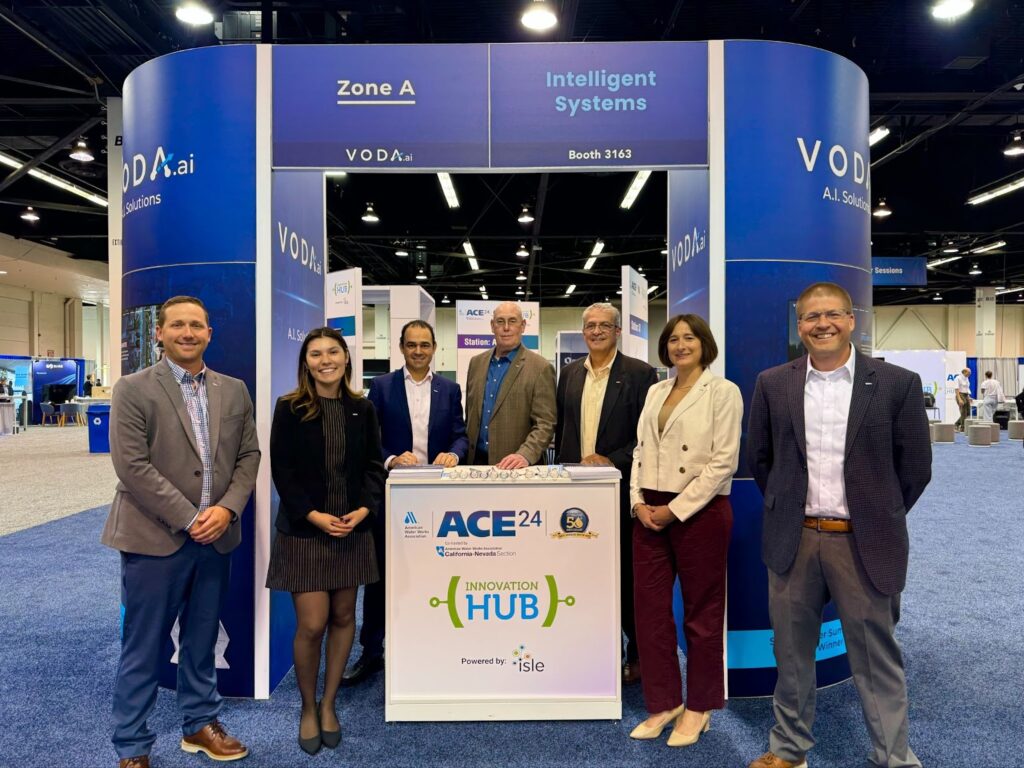
Founders: George Demosthenous & Jim Fitchett
Founding: 2017
Mission: Simplify engineering for water professionals
Employees: 29 & 20% Local
Workplace: Hybrid
Stage & Capital Raised: Seed & $5M Raised
Investors: Innospark, Ferguson Ventures, Massachusetts Clean Energy Center
Key Customers: Boston Water, Las Vegas Valley Water District, Tucson Water
Glassdoor Rating: 4.9
Valuation (estimated): $20M – $50M+ (assuming they sold ~10-20% of the company in the $5M Seed fundraise)
^ this is a useless number from MGMT Boston. There is no tangible valuation until the business is sold or goes public. Don’t forget it!
VODA, Slavic for water, is building software to make one of our scarcest, most important resources safer and more cost effective to manage. They are helping analyze our nation’s water infrastructure at a local level to deliver better service for utilities and local populations across the country.
Co-Founder & CEO George Demosthenous was working in product management at publicly traded Mueller Systems, a utility technology vendor that builds metering & network infrastructure for utilities. He was responsible for their software platform and often spoke with their utility engineer customers. George consistently heard that while the technology Mueller was selling was effective, the external pipe detection equipment and sensors they were purchasing didn’t necessarily stop leaks.
Water pipes are underground. And there are two types, dear reader. There are main lines, which run down streets and highways across a municipality. Then there are service lines which run from the main lines to the houses in the neighborhood.
If you can’t see the pipes, how do you figure out which ones are leaking?
There are 2.2M miles of drinking water pipes across the U.S. (src). In Jackson, MS more than 65% of their processed water does not make it to end customers. In Detroit’s Highland Park neighborhood an estimated 70% of water is lost from 120 year old pipes (src). Imagine if Apple shipped 100M iPhones stateside and 50M were littered across the Pacific Ocean floor on their way over from Asia. Crazy, right?
Millions of homes still have lead pipes, which can have all sorts of downstream health impacts and utilities are working hard to excavate them. There are environmental costs to go along with the taxpayer costs. Our nation’s drinking water infrastructure grade? C- (src). Not great!
When George laid out the problem for his Harvard graduate school professor Jim Fitchett, Jim’s eyes lit up. He had co-founded and sold a business in the medical device industry that used predictive analytics to identify patients with a high likelihood of a catastrophic health event like a heart attack or diabetes. If they could do it for humans, why couldn’t they do it for water pipes? That’s how VODA.ai started!
When water pipes are dug up, it costs millions of dollars and 50% of the time everything looks fine. So when George, Jim & team began digging into the problem they found it wasn’t a technology issue. The sensors perform. But the utilities have sensors in the wrong places. Improper placement renders the best water sensors in the world useless.
VODA.ai is building a software company that uses existing data to assess the condition of pipes that cannot be seen and determine which ones will have the highest likelihood of an event, like a leak or a break. VODA.ai created an AI engine dubbed “daVinciTM” here in Boston that uses pattern recognition in the way that LLMs probabilistically identify the next word in a sentence. daVinciTM has been tested head-to-head with other alternative models and has always outperformed! No pressure..
Their technology identifies the probability of where a failure could happen based on GIS (location data) and historical failure patterns from specific utility data. Then they leverage publicly available info like the soil, land use, property records, etc. and put that together with their own proprietary data to synthesize a combined model from those three datasets. Utility customers can set up a capital improvement plan (CIP) to prioritize their repairs or replacements in minutes instead of months.
Leak Monitoring helps provide insights for utilities to take action, determine where to replace a pipe, and where to put leak detection sensors. VODA.ai is also partnering with large leak detection sensor companies like Aquarius Spectrum (AQS) and Orbis as the main software provider to help utilities place their sensors more effectively.
VODA.ai’s most recent products in Lead Management help identify which pipes have the highest likelihood of being made with lead material. The EPA’s approaching October 2024 deadline for all US utilities to identify every lead pipe has proven the need for utilities to use smart tools like VODA.ai’s to race against time with their limited resources.
A SaaS startup, pricing is determined by miles of main & service line pipe analyzed per year. Their customer base, principally public and private water utilities, is predominantly in the U.S. with a handful of other countries represented. Their customers include Boston Water and Sewer Authority!
Since COVID they have grown both revenue & customer count by 200%+ y/y, continuing to leverage AI with both their product & team. AI’s emergence has helped VODA.ai’s sales cycle fall from a full year to three months as utilities broadly want to leverage best in class AI software.
This startup has already analyzed over 1M miles of pipe (almost 50% of America!) and over 2M miles of service lines with customers from Boston to San Jose, CA. They are planning to more than 2x revenue in 2024, becoming the go to decision support platform for water utilities across the country in the next five years.
VODA.ai is backed by local Boston investors Innospark and the Massachusetts Clean Energy Center. MassCEC has named VODA.ai a top carbon reduction emission leader, the team has twice been voted (by water utilities!) the Best Smart Water Solution at the Smart Water Summit, and VODA.ai plans to continue to grow their team in Boston in the quarters ahead.
Operators to Know:
- Kyra Dubinsky, Chief of Staff
- Cory Sides, SVP Sales
- Dan Hack, EVP of Operations and International Sales
- Lowell Rust, VP of Customer Success
If I were interviewing here are some questions I’d ask:
- Who are the key market participants VODA partners & competes against?
- What are the biggest challenges as you scale the team to the next phase of company growth?
- What is the long term vision for the company?
- What are the most important roles you’ll be looking to add in 2024 // teams that need the most help?
We’re optimizing for readability here so to learn more about VODA you’ll have to D.Y.O.R. I’m excited to watch this team bring more water analysis into the digital age. All humankind applaud your efforts. See you around town!
